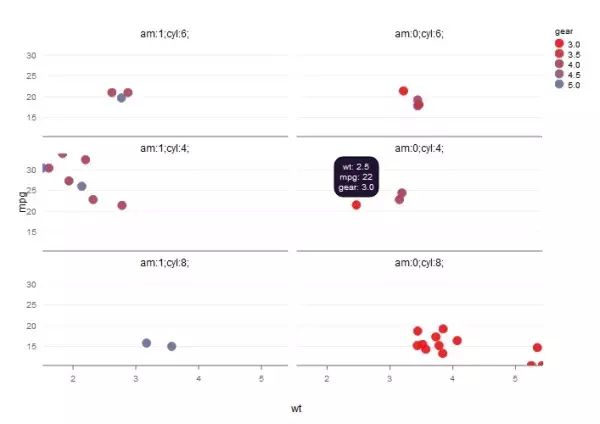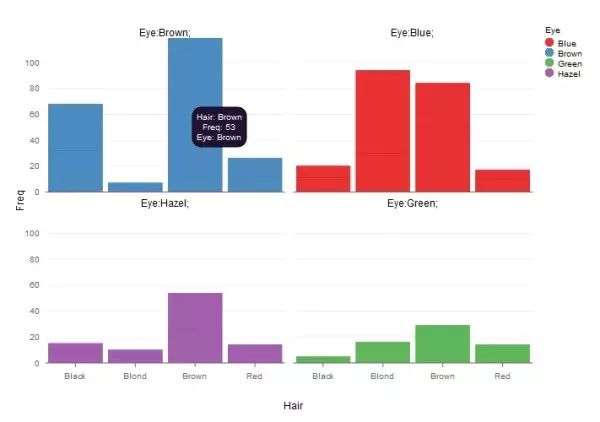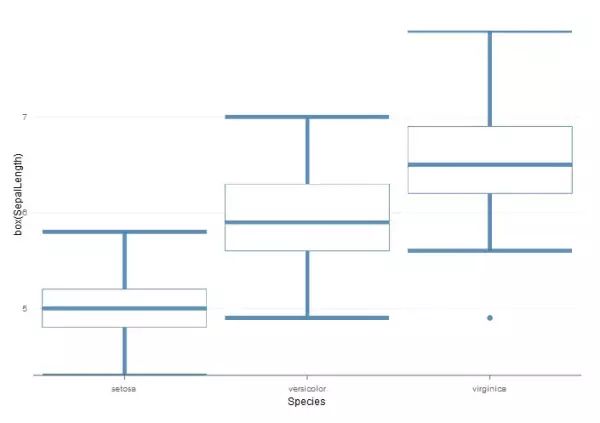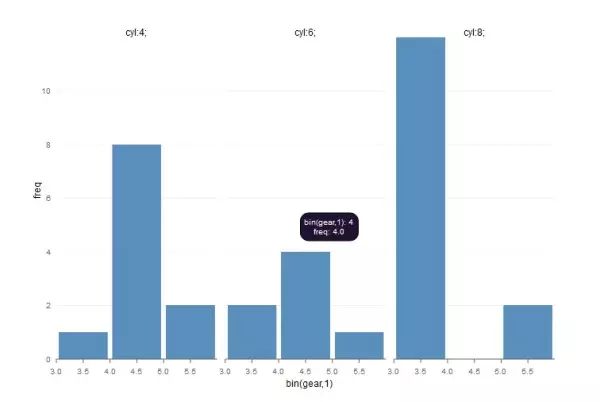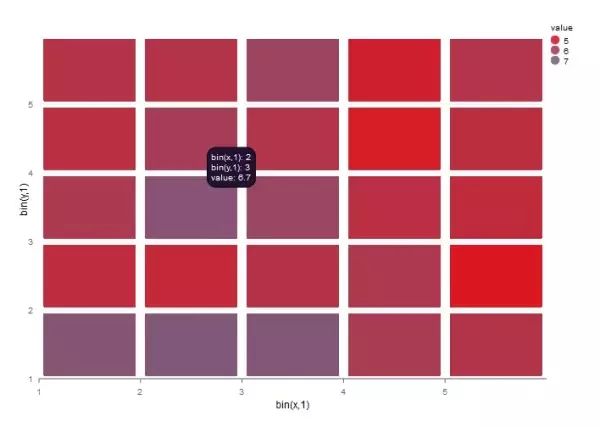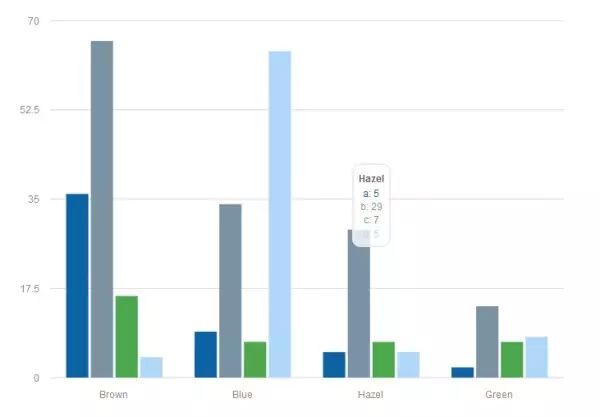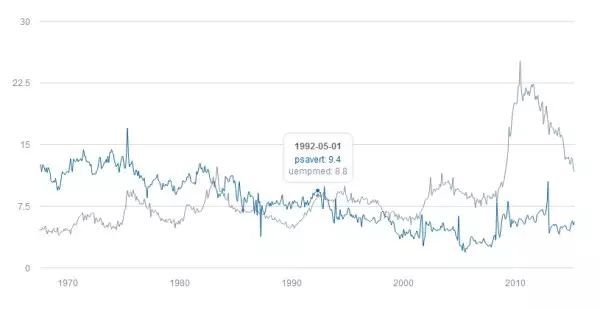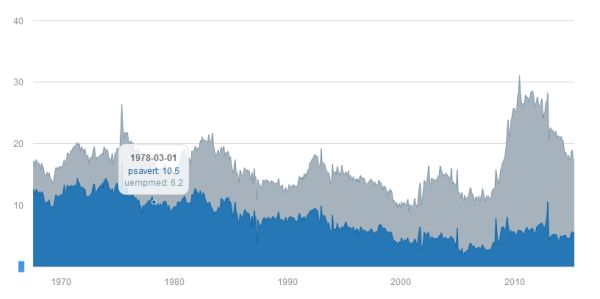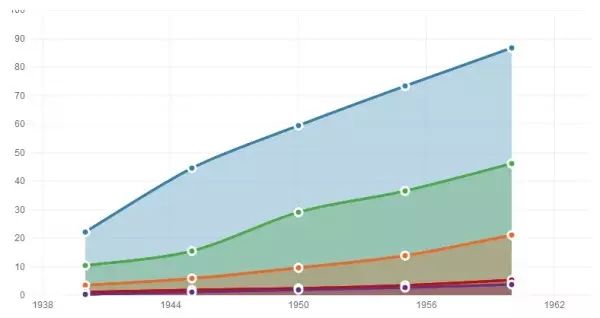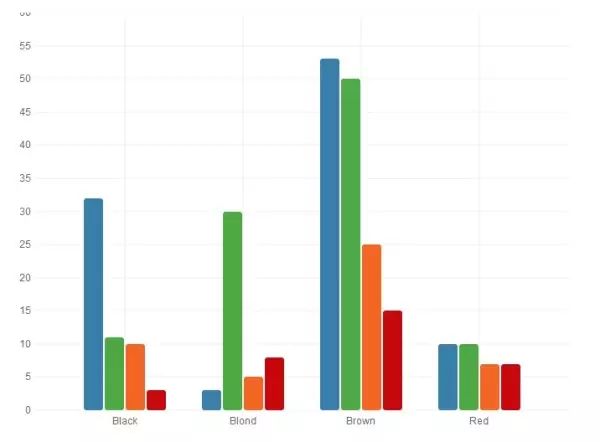R语言:交互可视化之rCharts包
文章转自知乎专栏 Jason
前言
rCharts是一个专门用来在R中绘制交互式图形的第三方包。关于交互式图形,之前我们在学习ggplot2包时略有提及(plotly包),今天所学习的rCharts包不仅是以交互图形的展示为目的,更重要的是该包有着一套自己的绘图风格,这为我们使用R进行可视化展示提供了更多的选择。
由于rCharts包目前并没有收录进CRAN,而是托管在GitHub上,所以我们需要先安装devtools包:
rCharts包的绘图函数类似lattice包,通过formula、data指定数据源和绘图方式,并通过type指定图表类型。基本格式如下:
> graph_function(formula,data=,option)一、Polychart
使用Polychart的rPlot()函数进行可视化展示。
Ploychart:a javascript charting library based on the grammar of graphics, and inspired by ggplot2
1. 散点图(Scatter Plot)
> library(rCharts)# 指定展示尺寸> options(RCHART_WIDTH = 700, RCHART_HEIGHT = 500)# 使用内置数据集iris# 按照Species的不同类型进行分面和颜色,指定绘图类型为"point"> rPlot(SepalLength ~ SepalWidth | Species, data = iris, color = 'Species', type = 'point')# 多重分面> rPlot(mpg ~ wt | am + cyl, data = mtcars, type = 'point',color = 'gear')2. 条形图(Barplot)
> p <- rPlot(Freq ~ Hair, color = 'Eye', data = hair_eye, type = 'bar')# 进行分面操作及指定行> p$facet(var = 'Eye', type = 'wrap', rows = 2)> p3. 箱线图(Boxplot)
> rPlot(x = 'Species', y = 'box(SepalLength)', data =iris, type = 'box')4. 柱状图(Column Plot)
> library(plyr)> data <- count(mtcars, .(gear, cyl))> data gear cyl freq1 3 4 12 3 6 23 3 8 124 4 4 85 4 6 46 5 4 27 5 6 18 5 8 2> rPlot(x = 'bin(gear,1)', y = 'freq', data = data, type = 'bar',list(var = 'cyl', type = 'wrap'))5. 热力图(Heat Map)
# 数据准备> data <- expand.grid(x = 1:5, y = 1:5)> data <- transform(data, value = iris$Sepal.Length)# 指定类型为tile> rPlot(x = 'bin(x, 1)', y = 'bin(y, 1)', color = 'value', data = data, type = 'tile')二、Morris
使用MorrisJS库的mPlot()函数进行可视化绘图。
Morris.js is the library that powers the graphs on http:// howmanyleft.co.uk/ . It's a very simple API for drawing line, bar, area and donut charts.
1. 条形图(Bar Chart)
# 数据准备> haireye <- as.data.frame(HairEyeColor)> data Hair Eye Sex Freq21 Black Blue Female 922 Brown Blue Female 3423 Red Blue Female 724 Blond Blue Female 64> mPlot(x = 'Hair', y = list('Freq'), data = data, type = 'Bar', + labels = list("Count"))# 绘制多重条形图> data <- subset(haireye, Sex == "Female")> head(data) Hair Eye Sex Freq17 Black Brown Female 3618 Brown Brown Female 6619 Red Brown Female 1620 Blond Brown Female 421 Black Blue Female 922 Brown Blue Female 34> mPlot(Freq ~ Eye, group = "Hair", data = data, type = "Bar", + labels = c('a','b','c','d'))2. 折线图(Line Chart)
# 使用ggplot2的economics数据集> library(ggplot2)> data <- transform(economics,date=as.character(date))> p <- mPlot(x = 'date', y = c('psavert', 'uempmed'), type = 'Line',data = data)> p$set(pointSize = 0, lineWidth = 1)> p> data <- transform(economics,date=as.character(date))> p <- mPlot(x = "date", y = list("psavert", "uempmed"), data = data, type = 'Line',pointSize = 0, lineWidth = 1)> p$set(type = 'Area')> p三、xCharts
xCharts is a D3-based library for building custom charts and graphs. Written and maintained by tenXer.
调用函数: xPlot()
1. 折线图(Line Chart)
# 使用melt()函数进行数据重塑> library(reshape2)> uspexp <- melt(USPersonalExpenditure)> head(uspexp) Var1 Var2 value1 Food and Tobacco 1940 22.2002 Household Operation 1940 10.5003 Medical and Health 1940 3.5304 Personal Care 1940 1.0405 Private Education 1940 0.3416 Food and Tobacco 1945 44.500> names(uspexp)[1:2] <- c('category', 'year')> xPlot(value ~ year, group = 'category', data = uspexp, + type = 'line-dotted')# 数据准备> haireye <- subset(as.data.frame(HairEyeColor), Sex == "Male")> head(haireye) Hair Eye Sex Freq1 Black Brown Male 322 Brown Brown Male 533 Red Brown Male 104 Blond Brown Male 35 Black Blue Male 116 Brown Blue Male 50> xPlot(Freq ~ Hair, group = 'Eye', data = haireye, type = 'bar')附学习文档:
RPubs - rCharts Package Tutorial
Interactive Charts from R using rCharts
Editor: 利用R语言进行交互数据可视化 | 统计之都
GitHub - ramnathv/rCharts: Interactive JS Charts from R
——————————————
往期精彩:
我造的假我自己打,Adobe推出“反PS”
微软删除人脸识别,除了隐私,更重要的可能是性别歧视与种族主义
亚马逊在中国失败,而中国却在亚马逊成功
![]()

